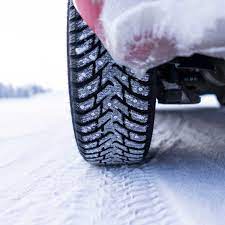To answer the question, “Do snow tires help on ice?” — they absolutely do. Snow tires are covered with a compound that helps the tire grip icy roads and provide better traction than all-season tires.
Snow tires have a greater ability to grip the road and provide traction than all-season or summer tires because of their softer rubber compounds. This is due to the fact that snow tires are designed specifically for cold temperatures, where all-season and summer tire performance decreases as temperatures fall below 45 degrees Fahrenheit.
Snow tires also have different tread patterns than all-seasons or summer tires. The tread pattern of snow tires features deeper grooves and wider gaps between lugs that fill up with snow, creating more contact points with the ground to improve traction in slippery conditions.
there’s always a chance of sliding on black ice or an icy surface.
The first and most important thing to know is that not all winter tires are the same. Some winter tires were designed to be better on snow, while others are designed with wet road conditions in mind. Snow and ice tires are, of course, meant for areas that see a lot of snowfall. Studded and studless tires also have distinct advantages based on weather patterns and local laws. And finally, there’s a difference between tread depth and tread width when it comes to a tire’s abilities in winter weather.
But keep in mind: no matter what tire you have, there’s always a chance of sliding on black ice or an icy surface.
having winter tires with proper tread will help you have more control and traction when driving in slippery conditions.
Snow tires aren’t made to make it easier for you to drive, but to improve the safety of your car so that you can better handle bad weather. Tread is the most important part of a winter tire because it gives your car more traction on wet, icy roads. The deeper and more pronounced the treads on your tires, the better control that you’ll have over your vehicle in slippery conditions. While all-season tires don’t offer this same kind of extra traction, winter tires do – and that’s what makes them safer for driving in snow.
winter tires are specifically designed to perform well in icy conditions
Winter tires are designed with a tread that is made for snow and ice. They have a softer rubber compound that works better in the cold. Winter tires are specifically designed to perform well in icy conditions so if you live somewhere where the roads are icy then it’s worth it to invest in a set of winter tires.
the tread on snow tires can make all the difference in how your vehicle handles in snow and ice.
The tread on snow tires can make all the difference in how your vehicle handles in snow and ice. While all-season tires will have a more smooth appearance, the deeper more pronounced grooves allow for better traction on a slippery surface and give you more control over how your car operates.
Snow tires are designed to handle not only icy roads, but also snowy ones as well. Snow tires help grip below the surface of the snowy road, which is what helps you safely navigate through it. When there is only a skiff of snow or ice on top of dry pavement, there isn’t much that separates your tire from the road. Even when there are layers of snow and ice atop pavement, standard all-weather or all-season tires don’t necessarily provide enough traction to keep you safe as you drive over them. They can slide around easily as they are not made specifically for this type of weather condition.
the deeper more pronounced grooves allow for better traction on a slippery surface
The deeper more pronounced grooves allow for better traction on a slippery surface and give you more control over how your car operates.
Tires have tread patterns that are designed to grip the road by dispersing water, mud, rocks and snow. The deeper the tread is on the tire, the better it can disperse this material and gain traction. Many consumers are under the impression that snow tires must have deep grooves to work properly. While having a deep tread pattern is important, it’s only one of many characteristics that make a good snow tire.
Snow tires help on ice, though they are not a cure-all
In short, yes. Snow tires help on ice, though they are not a cure-all.
First and foremost, it’s important to note that snow tires are not a substitute for safe driving. A set of snow tires can give your car better traction and control on icy roads, but there is no rubber compound in the world that will allow you to drive safely at unsafe speeds. Be smart when driving in winter weather: take your time, slow down when appropriate, leave extra space between yourself and other drivers, and stay home if you’re able to do so.
Now that we’ve established why safe driving should be your main priority any time you’re behind the wheel—regardless of the season or weather conditions—let’s look at how snow tires can provide an element of safety and peace of mind during inclement weather.

